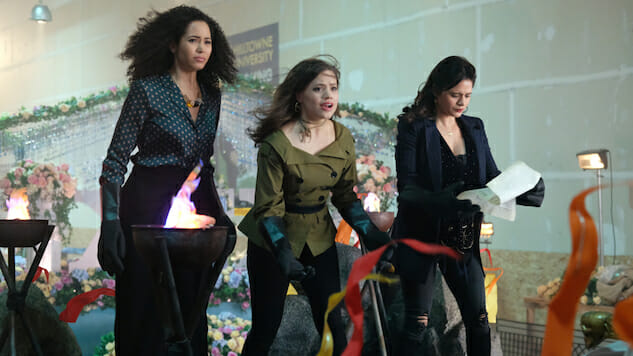“We Can’t Be Pushed Around”: How the Showrunners Remade Charmed for the #MeToo Generation
Photo: Robert Falconer/The CW
The first iteration of Charmed, which aired for eight seasons on The WB and The CW in the late 1990s and early 2000s, was often written off as a naïve, almost box-checking spin on feminism and female bonding, wrapped in silk camis and low-rise jeans: Three sisters, each with her own unique power, stick together through thick and thin to vanquish demons with impeccably timed rhyming couplets.
The fact that two of the original’s stars—Alyssa Milano and Rose McGowan—are now best known as activists and sexual assault survivors is just one example of how much we underestimated it. Which might explain why the revamped Charmed, which premiered last month on The CW, has attracted such scrutiny, from skeptical fans, critics, and even original cast member Holly Marie Combs, who criticized the reboot for ageism: Between respecting the legacy of the original and responding to our own political moment, the three new Charmed ones have to be the wokest witches in all the land.
Thankfully, so far, they deliver. The first episode name-checks trailblazing author and cultural critic Roxane Gay, and much of the early part of the season deals with the ramifications of a female college student’s decision to stand up to a powerful male professor. (Because this is Charmed, he’s—naturally—a demon who siphons the energy of strong-willed women). Although two of the sisters were raised together, each of the three has a different father, and all are played by women of color.
“We started with this premise that historically, powerful women have been called witches, and what if it’s true,” says Amy Rardin, who created the new series with co-showrunner Jessica O’Toole and their former Jane the Virgin boss, Jennie Snyder Urman. “We really sparked to that, and we feel that that is the tone and the voice in our head when we’re writing episodes: Strong women and strong female stories.”
Rardin and O’Toole stress that they are primarily looking for stories that would interest young women, with the latter explaining that stories like the demon professor metaphor “help to make it not just a lecture, [but] that you’re doing but something fun.”
Still, the pair tries to approach sensitive topics with tactfulness and respect. For instance, it was recently revealed that eldest sister, Macy (Madeleine Mantock), is a 28-year-old virgin. Though this is a soapy drama, and the writers will most certainly be playing this storyline out, Rardin and O’Toole say they’re careful not to make Macy’s virginity a factor that humiliates her.
“It’s definitely something she has to deal with as she explores relationships on the show,” says O’Toole, who has spent plenty of time thinking about this very topic on Jane. “Letting somebody know… when she’s ready to not be a virgin, or even how someone’s powers react when one has sex for the first time [will be discussed]. It’s embarrassing for everyone to lose your virginity, and then you have a power that’s tied in with your emotions.”
Rardin and O’Toole acknowledge that there’s a liberal subtext at play in the new Charmed. Macy, for example, is a woman of color working in a STEM career, meaning she’s both a role model to younger viewers and a way to challenge stereotypes that older viewers may be accustomed to seeing on screen. Sometimes these messages are unintentional; despite the way it looks so far, not all of the demons on Charmed will take the shape of white men.
And, unlike Gina Rodriguez’s title character on Jane, these women are not always going to be the moral center of the show. They are newly minted witches and therefore very, very fallible. The most recent episode, “Exorcize Your Demons,” was the first to show that the sisters can’t save everyone when a well-meaning police officer died as a result of their actions. This guilt and pain carries into the upcoming fifth episode, “Other Women,” with particular repercussions for middle sister Mel (Melonie Diaz).
-

-

-

-

-

-

-

-

-

-

-

-

-

-

-

-

-

-

-

-

-

-

-

-

-

-

-

-

-

-

-

-

-

-

-

-

-

-

-

-








































